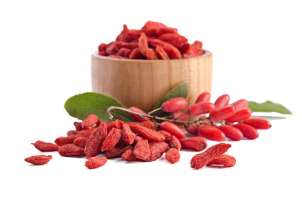Top 5 Health Benefits of Aronia Berries
Small, blackberries known as Aronia have gained popularity among health-conscious customers. They are indigenous to North America but are farmed worldwide, ... read more...especially in Europe. They are one of the most abundant sources of plant antioxidants, which are thought to have a variety of health-enhancing characteristics. This article discusses the nutrition and advantages of Aronia berries that you need to know.
-
Aronia berries are low in calories but pack a nutritional punch, as they’re high in fiber, vitamin C, and manganese. Just 1 ounce (28 grams) of Aronia berries provides the following nutrients:
- Calories: 13
- Protein: .4 grams
- Fat: 0.1 grams
- Carbs: 2.7 grams
- Fiber: 1.5 grams
- Vitamin C: 10% of the Daily Value (DV)
- Manganese: 9% of the DV
- Vitamin K: 5% of the DV
The berries also supply folate, iron, and vitamins A and E. Plus, they’re an excellent source of beneficial antioxidants, which help protect your cells from potentially harmful molecules called free radicals. Aronia berries are particularly high in anthocyanins, which give the berries their dark blue to black color

High in nutrients 
High in nutrients -
The antioxidant content is high in Aronia berries. These substances protect your cells from the harm that free radicals may do. Oxidative stress, which can result from a buildup of free radicals, is a risk factor for chronic diseases including cancer and heart disease. The antioxidant class known as polyphenols, which also includes phenolic acids, anthocyanins, and flavonols, is quite abundant in Aronia berries.
The antioxidants in Aronia berries have been shown in test-tube research to be able to reduce free radical activity. The berries themselves also outperformed four other berries in terms of antioxidant activity. Another test-tube research that took blood samples from 30 healthy individuals also discovered that Aronia berry extracts greatly decreased the oxidative stress brought on by an antipsychotic drug within 24 hours. Additionally, research in test tubes has connected the antioxidants in these fruits to additional outstanding health advantages, including lowered inflammation and slowed bacterial and colon cancer cell development.

Contain powerful antioxidants 
Contain powerful antioxidants -
Aronia berries may offer cancer protection. The anthocyanins in Aronia berries may inhibit the development of colon cancer cells, according to test-tube and animal research. In one test-tube investigation, it was shown that 50 mg of Aronia extract slowed the development of colon cancer cells by 60% after just 24 hours. This anti-cancer action is assumed to be a result of anthocyanins' strong antioxidant activity.
Similarly, berry extracts may lessen the oxidative stress linked to breast cancer. These extracts decreased the quantity of dangerous superoxide free radicals in blood samples obtained from breast cancer patients in one research. However, given the paucity of available data, human studies are required to assess the connection between Aronia berries and cancer prevention.

May have anticancer effects 
May have anticancer effects -
Aronia berries' antioxidant qualities may help heart health. They may especially benefit those who have metabolic syndrome, a group of disorders that includes high triglyceride and cholesterol levels and raises the risk of diabetes and heart disease.
Taking supplements containing 300 mg of Aronia extract daily resulted in a substantial reduction in triglycerides, LDL (bad) cholesterol, and total cholesterol in a 2-month trial of 38 individuals with metabolic syndrome. The same health indices and blood pressure were considerably lowered by ingesting 300 mg of Aronia extract daily in a comparable 2-month trial of 25 individuals with metabolic syndrome. To determine the potential function of Aronia berries in heart health, the more human study is required.

May benefit heart health 
May benefit heart health -
Your immune system may be boosted and supported by Aronia berries. Aronia berry extracts demonstrated significant antibacterial activity against the potentially dangerous pathogens Escherichia coli and Bacillus cereus in test-tube research. It accomplished this by reducing the amount of a biofilm-like defense mechanism produced by the bacteria. In addition, a three-month trial of residents of six nursing homes revealed that urinary tract infections were reduced by 38 and 55 percent, respectively, in those who drank 3 or 5.3 ounces (89 or 156 mL) of Aronia berry juice daily.
By preventing the generation of pro-inflammatory molecules including interleukin 6 (IL-6) and tumor necrosis factor-alpha (TNF-), Aronia berries may help lessen inflammation and maybe improve immunological function. The berries may also have antiviral properties. The ellagic acid and myricetin in Aronia berry extract may offer protection from the influenza virus, according to mouse research.

May provide immune support 
May provide immune support


























